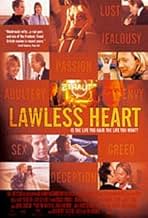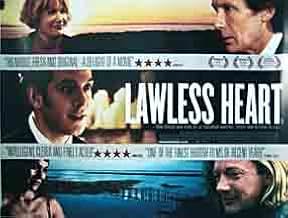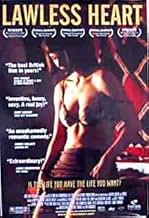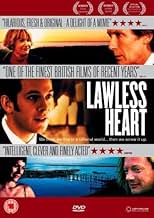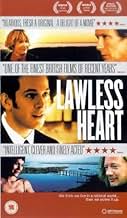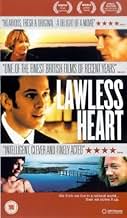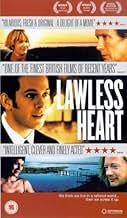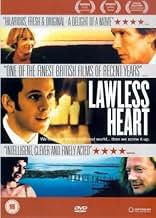IMDb रेटिंग
6.6/10
1.5 हज़ार
आपकी रेटिंग
अपनी भाषा में प्लॉट जोड़ेंThree intersecting stories about people whose lives are affected by the death of a gay restaurateur.Three intersecting stories about people whose lives are affected by the death of a gay restaurateur.Three intersecting stories about people whose lives are affected by the death of a gay restaurateur.
- निर्देशक
- लेखक
- स्टार
- पुरस्कार
- 9 जीत और कुल 7 नामांकन
Hari Dhillon
- Will
- (as Hari Dillon)
फ़ीचर्ड समीक्षाएं
This was probably the finest film I saw last year. From its first scene, with the ever-so-English Bill Nighy, it was funny, sad and thought-provoking in equal measures. Nighy's turn as the confused, homophobic but well-meaning Dan was strong, and fully engaged our sympathies, but was trumped when we rewound and saw the same events as Nick (Tom Hollander). Hollander has a marvellous ability to show endless longing in a single eye movement - he's a remarkable actor and once again gave us a fully empathetic character. Sukie Smith, the opposite of his character, was clumsy but lovable as Charlie, and that segment felt almost self-contained.
When we rewound again to see Tim's viewpoint, I was a little disappointed. Tim had proved a horrible, selfish character, and I didn't fancy "being" him for any length of time. But Doug Henshall blew my mind in a performance that completely changed my view of his character and led to a moving and satisfying resolution.
In each of these men we are offered a different aspect of the Everyman. We learn that no-one is as they appear. Other laudable aspects are the uniformly strong supporting cast, the beautiful photography and music, but above all the little details. For example, Tim spooning sugar off the floor was genius. And in the restaurant when he makes a ring for Leah out of wire. And then the ashtray catches fire. Also, spot Corrine's dinner party in the background as Dan drives past. Look out for as many of these as possible! This is a film in which every detail is thought through, and it contributes for a cinematically enriching experience. SEE IT.
When we rewound again to see Tim's viewpoint, I was a little disappointed. Tim had proved a horrible, selfish character, and I didn't fancy "being" him for any length of time. But Doug Henshall blew my mind in a performance that completely changed my view of his character and led to a moving and satisfying resolution.
In each of these men we are offered a different aspect of the Everyman. We learn that no-one is as they appear. Other laudable aspects are the uniformly strong supporting cast, the beautiful photography and music, but above all the little details. For example, Tim spooning sugar off the floor was genius. And in the restaurant when he makes a ring for Leah out of wire. And then the ashtray catches fire. Also, spot Corrine's dinner party in the background as Dan drives past. Look out for as many of these as possible! This is a film in which every detail is thought through, and it contributes for a cinematically enriching experience. SEE IT.
Of all the films I watched at the London Film Festival, this one stood out head and shoulders above the rest. Bill Nighy's opening performance had me mesmerised for the first twenty minutes, and the film maintained these high standards throughout.
The cinematography is superb, as are all of the performances from a very skilled and believable cast. The intertwined storylines reminded me of Kieslowski's Three Colours Trilogy, where everything comes together right at the end.
So much for the poor state of the British film industry, watch this and have your faith restored - a wonderful film in every aspect!
The cinematography is superb, as are all of the performances from a very skilled and believable cast. The intertwined storylines reminded me of Kieslowski's Three Colours Trilogy, where everything comes together right at the end.
So much for the poor state of the British film industry, watch this and have your faith restored - a wonderful film in every aspect!
This movie tells the same story from the viewpoint of three different people. The stories are presented in sequence and cover the same time span - the three characters are together in the first scene as well as several days later in the final scene. The event that brings them together in the first scene is the funeral reception for a man who was the brother-in-law of Dan (Bill Nighy), the lover of Nick (Tom Hollander), and the cousin and friend of Tim (Douglas Henshall). The plot structure is clever and works well. One of the challenges in telling a story in this manner that is effectively dealt with is to strike a balance in how much the characters interact - too little and the movie becomes three separate stories; too much and all the characters, as well as the viewers, know the whole story and there are no surprises. This plot structure is distinctly different from those of "Rashomon," where each character relates the same story with personal embellishments, or "Pulp Fiction," where the stories are only loosely intersecting and the time sequencing is not linear, or movies like "Lantana," which effectively utilizes flashbacks and interactions in real time among an ensemble of unrelated characters.
With each succeeding scene in each story we fill in pieces of the puzzle. The curious way people behave in one story is understood in a later story. For example, when Tim throws a party and invites a woman with whom he has just been enamored, she shows up only to hide behind a wall and ultimately escape the party by climbing over a fence. Tim is hard pressed to interpret this peculiar behavior and Dan, who witnesses the escape from outside the house, is mystified. How odd we think, but later we learn that a recent ex-lover of hers is there and she does not want an encounter with him.
We are made to think about how each of us sees only a small piece of the big picture. Each personal human encounter is the intersection of two worlds, the complex histories of which are fully known only by the individuals. People behave in ways that we find difficult to comprehend, but, in almost all situations, if we were to know the personal motivations and the full story, all would be understood.
To a great extent, the dialog carries the movie. When Dan is approached by an interested woman, Corrine, at the funeral reception and she asks him if he is depressed, he says, "How would I know?"
While the movie hangs together on first viewing, I found a second viewing to be rewarding. You pick up on a lot of things that would easily be missed on first viewing, like when Corrine invites Dan to dinner while checking out at the grocery store the cashier is a woman with whom Nick becomes involved.
The acting is polished and the multitude of songs on the soundtrack seem to have been chosen with care and they augment the story. It was uncharitable not to credit the Schubert piano trio that so effectively set the mood at the beginning and the end (Trio in E flat, Op. 100 D.929).
Altogether an engaging and skillful piece of film-making.
With each succeeding scene in each story we fill in pieces of the puzzle. The curious way people behave in one story is understood in a later story. For example, when Tim throws a party and invites a woman with whom he has just been enamored, she shows up only to hide behind a wall and ultimately escape the party by climbing over a fence. Tim is hard pressed to interpret this peculiar behavior and Dan, who witnesses the escape from outside the house, is mystified. How odd we think, but later we learn that a recent ex-lover of hers is there and she does not want an encounter with him.
We are made to think about how each of us sees only a small piece of the big picture. Each personal human encounter is the intersection of two worlds, the complex histories of which are fully known only by the individuals. People behave in ways that we find difficult to comprehend, but, in almost all situations, if we were to know the personal motivations and the full story, all would be understood.
To a great extent, the dialog carries the movie. When Dan is approached by an interested woman, Corrine, at the funeral reception and she asks him if he is depressed, he says, "How would I know?"
While the movie hangs together on first viewing, I found a second viewing to be rewarding. You pick up on a lot of things that would easily be missed on first viewing, like when Corrine invites Dan to dinner while checking out at the grocery store the cashier is a woman with whom Nick becomes involved.
The acting is polished and the multitude of songs on the soundtrack seem to have been chosen with care and they augment the story. It was uncharitable not to credit the Schubert piano trio that so effectively set the mood at the beginning and the end (Trio in E flat, Op. 100 D.929).
Altogether an engaging and skillful piece of film-making.
In the funeral of Stuart, his sister Judy (Ellie Haddington) defends to her husband Dan (Bill Nighy) that his money should be delivered to his mate, the gay restaurateur Nick (Tom Hollander) since there is no will but that should be the wish if his brother-in-law. The faithful Dan meets the Frenchwoman Corrine (Clémentine Célarié) and he has the feeling that part of his life was lost. Meanwhile the grieving Nick hosts Stuart's best friend, the former hippie Tim (Douglas Henshall) at home. Tim has a crush on the worker of a fashion store Leah (Josephine Butler), who is heartbroken and healing from her last love affair, and he decides to give a party for her at Nick's place. After the party, Dan never meets Corrine in respect to his wife and but the drunken Michelle (Sally Hurst) gives a BJ on him; Nick befriends Charlie (Sukie Smith) that falls in love for him; and Tim finds that Leah's secret love is his stepbrother David (Stuart Laing).
After a complicated beginning due to the great number of characters, "Lawless Heart" becomes interesting with the entwined lives of several lead characters and the same story is retold centered in Dan, Nick and Tim and filling the blanks. The less interesting segment is the ironical situation of Dan, where the British dark humor prevails in a questionable sense of fidelity. In the end, the screenplay with open end works reasonably well developing the realistic characters and situations and the result is a good low-budget movie supported by great performances. My vote is six.
Titile (Brazil): "Coração Sem Lei" ("Lawless Heart")
After a complicated beginning due to the great number of characters, "Lawless Heart" becomes interesting with the entwined lives of several lead characters and the same story is retold centered in Dan, Nick and Tim and filling the blanks. The less interesting segment is the ironical situation of Dan, where the British dark humor prevails in a questionable sense of fidelity. In the end, the screenplay with open end works reasonably well developing the realistic characters and situations and the result is a good low-budget movie supported by great performances. My vote is six.
Titile (Brazil): "Coração Sem Lei" ("Lawless Heart")
After the death by drowning of a small time homosexual restaurateur by the name of Stuart (David Coffey), three sets of lives are changed and altered: not only by the death itself, but by each others reactions and counter-reactions to the tragedy.
Anyone who has put on their "reading glasses" and watched any worthwhile number of European cinema will have been confronted by films about "small people" who lives seem petty and insignificant in the telling (or even in the retelling to others): but reflect more about you and your life than the complete cannon of Bruce Willis. This is another example.
Lawless Heart (an over-the-top and misleading title) takes on a very simple story of loss, passing and the small amount of attached inheritance money. Nevertheless, it has to be borne in mind that the cash would mean a lot to the people who would receive it. There is also the vexed question of "natural justice." Something I don't want to flesh-out further in this review.
Maybe to try and distance itself from quality television, the film uses separate point-of-view flashbacks and although it might sound complicated and tricky in-the-telling, it is not too difficult a concept in-the-watching.
(Once you catch on to the technique that is. It left me a little confused for a while.)
While I enjoyed this film enormously, I must start with a string of petty irritations and focus bringers. The first being that there is really nothing new on the menu (no restaurant pun intended), the French have been doing this type of thing for years without the rest of the world really noticing.
(Those that enjoyed this film and want "more of the same" might like to start with the 1983 "Pauline à la plage." Not the same story - far from it - but the same basic approach and small home truths.)
Equally a list of well known emotion wranglers have been blended in to try and soft soap the potential audience: The use of emotive music (Adrian Johnston), 8 mm home movies and time-lapse photography has all been done before; although this film shows some imagination even in borrowing!
The movie deals with a homosexual relationship in a welcome manner. It is no more abnormal than anyone else's relationship, although that doesn't mean that everyone approves or wishes things weren't different.
Equally it never presents anything as the-end-of-the-world. People may - or may not - come in to the small amount of money we have already mentioned, but we are sure they will all survive whichever way the cookie crumbles.
Small town life is well captured, although with any ensemble piece you have your favourites. It doesn't really present women in any great light with the dorkish Charlie (Sukie Smith) providing some comic relief as the slightly out-of-it party girl who cannot - after a hard days night - even remember where she lives!
Thankfully no one is that smooth an operator and the various "rejecting women" probably have a certain amount of good taste. Layabout Tim (Douglas Henshall) is actually fascinating as we take an instant dislike to him and his leeching ways, but we slowly warm to him as the picture goes on - even if he shows no appetite for having a regular job or living anything other than a self-centred life.
Trust me I am not a sucker for sentimentality or bland emoting. Someone crying or in grief doesn't prompt me - automatically - to feel the same way, and there are plenty of characters here that could do with a good shake if not a soft kick up the backside.
In most ways Lawless Heart is a "soft sell" movie: It doesn't want to sell you anything unless you want to be a buyer of it: People live, people die, people fall in love, people fall out of love, people are mismatched in love. Occasionally people even come to terms with the limits of others.
Good work all round from the actors, producers and musicians. Without a fortune to spend I was quietly moved, even though I was trying hard not to be.
Anyone who has put on their "reading glasses" and watched any worthwhile number of European cinema will have been confronted by films about "small people" who lives seem petty and insignificant in the telling (or even in the retelling to others): but reflect more about you and your life than the complete cannon of Bruce Willis. This is another example.
Lawless Heart (an over-the-top and misleading title) takes on a very simple story of loss, passing and the small amount of attached inheritance money. Nevertheless, it has to be borne in mind that the cash would mean a lot to the people who would receive it. There is also the vexed question of "natural justice." Something I don't want to flesh-out further in this review.
Maybe to try and distance itself from quality television, the film uses separate point-of-view flashbacks and although it might sound complicated and tricky in-the-telling, it is not too difficult a concept in-the-watching.
(Once you catch on to the technique that is. It left me a little confused for a while.)
While I enjoyed this film enormously, I must start with a string of petty irritations and focus bringers. The first being that there is really nothing new on the menu (no restaurant pun intended), the French have been doing this type of thing for years without the rest of the world really noticing.
(Those that enjoyed this film and want "more of the same" might like to start with the 1983 "Pauline à la plage." Not the same story - far from it - but the same basic approach and small home truths.)
Equally a list of well known emotion wranglers have been blended in to try and soft soap the potential audience: The use of emotive music (Adrian Johnston), 8 mm home movies and time-lapse photography has all been done before; although this film shows some imagination even in borrowing!
The movie deals with a homosexual relationship in a welcome manner. It is no more abnormal than anyone else's relationship, although that doesn't mean that everyone approves or wishes things weren't different.
Equally it never presents anything as the-end-of-the-world. People may - or may not - come in to the small amount of money we have already mentioned, but we are sure they will all survive whichever way the cookie crumbles.
Small town life is well captured, although with any ensemble piece you have your favourites. It doesn't really present women in any great light with the dorkish Charlie (Sukie Smith) providing some comic relief as the slightly out-of-it party girl who cannot - after a hard days night - even remember where she lives!
Thankfully no one is that smooth an operator and the various "rejecting women" probably have a certain amount of good taste. Layabout Tim (Douglas Henshall) is actually fascinating as we take an instant dislike to him and his leeching ways, but we slowly warm to him as the picture goes on - even if he shows no appetite for having a regular job or living anything other than a self-centred life.
Trust me I am not a sucker for sentimentality or bland emoting. Someone crying or in grief doesn't prompt me - automatically - to feel the same way, and there are plenty of characters here that could do with a good shake if not a soft kick up the backside.
In most ways Lawless Heart is a "soft sell" movie: It doesn't want to sell you anything unless you want to be a buyer of it: People live, people die, people fall in love, people fall out of love, people are mismatched in love. Occasionally people even come to terms with the limits of others.
Good work all round from the actors, producers and musicians. Without a fortune to spend I was quietly moved, even though I was trying hard not to be.
क्या आपको पता है
- क्रेज़ी क्रेडिटSpecial thanks to ... all at Casarotta ... the residents of Maldon, Essex and the Isle of Man.
- साउंडट्रैकI Can't Help Myself
(1998)
Written by Mark Hadfield, Adam Ryan-Carter
Published by Sony/ATV Music Publishing
Performed by Lucid
Licensed courtesy of Warner Strategic Marketing UK and 1999 Delicious Records Ltd
टॉप पसंद
रेटिंग देने के लिए साइन-इन करें और वैयक्तिकृत सुझावों के लिए वॉचलिस्ट करें
विवरण
- रिलीज़ की तारीख़
- कंट्री ऑफ़ ओरिजिन
- आधिकारिक साइटें
- भाषा
- इस रूप में भी जाना जाता है
- Corazones desenfrenados
- फ़िल्माने की जगहें
- उत्पादन कंपनियां
- IMDbPro पर और कंपनी क्रेडिट देखें
बॉक्स ऑफ़िस
- US और कनाडा में सकल
- $3,30,067
- US और कनाडा में पहले सप्ताह में कुल कमाई
- $15,544
- 23 फ़र॰ 2003
- दुनिया भर में सकल
- $5,39,596
इस पेज में योगदान दें
किसी बदलाव का सुझाव दें या अनुपलब्ध कॉन्टेंट जोड़ें


